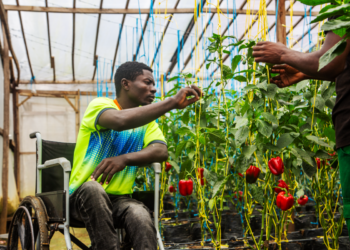By Victoria A. Abuin
Agriculture is the heartbeat of our nation. Statistics show that the sector employs a staggering 68.1 percent of Uganda’s population, whilst contributing about 24.1 percent to the national GDP. This highlights the sector’s importance. But it is not without its challenges. These include low productivity, limited access to finance and markets, and the ever – looming effects of climate change. To overcome these challenges, Agritech is emerging as a vital tool to reshape agribusiness and transform the agriculture sector while driving financial inclusion.
Agritech, defined
Agritech is the fusion or blending of agriculture and technology. It promises to revitalise and potentially revolutionise agriculture all over the world. Agritech innovations include mobile phone applications, AI tools, data analytics, sensors and digital platforms which are aimed at improving efficiency, sustainability, and profitability across the agricultural value chain. A report by Feed the Future provided six use cases of Agritech namely, “advisory and information, market linkages and access, financial access, supply chain management, enterprise management and efficiency, and enterprise research and development.”
The rise of Agritech
According to AgFunder, Agritech is evolving into a multibillion-dollar industry with global investments exceeding $29 billion in 2022. In 2023, the same report noted that there were 1,400 digital solutions for agriculture in low- and middle-income countries with 50 percent of these in Sub–Saharan Africa.
Notably, Kenya was the pioneer of Agritech on the continent, having started in the early 2010s. Two West African countries – Nigeria and Ghana – have since emerged. Currently, the three countries alone dominate 60 percent of Africa’s active Agritech startups. These account for a volume of about a billion US Dollars with an active reach upward of 33 million users.
The Agritech industry has realised steady growth particularly between 2020 to 2022, because of the COVID-19 pandemic restrictions on movement. This led to farmers interacting digitally, registering an exponential growth in the sector. This was driven by rising innovation, increasing investment and the need to improve agricultural productivity and sustainability.
Agritech for financial inclusion
The efficiency of technology in reaching the financially excluded and underserved is no secret. No wonder, the growth of Agritech has also showcased its potential in driving financial inclusion especially for the smallholder farmers who are often excluded.
Agritech plays a key role in financial inclusion by aggregating farmers into small holder groups and cooperatives enabling bulk food production. This triggers easier access to larger markets and financial services. Additionally, Agritech facilitates efficient and free trade, ultimately helping small holder farmers scale their operations, reduce transaction costs and improve their entire process of production.
Agritech drives financial inclusion by digitising agricultural value chains through forward and backward linkages. This allows farmers to have access to inputs and markets more efficiently. It also provides vital information, such as weather updates, planting season cycles, pest control measures, market prices and connects them to extension service expertise empowering farmers to make informed decisions.
Harnessing big data within the Agritech ecosystem is helping advance and scale financial inclusion. By improving data collection, analysis, reporting, documentation and profiling of farmers, it provides valuable insights. These insights enable the de-risking of agricultural investments resulting into tailored financial services that meet the needs of farmers in a better way.
Using and adopting Agritechs creates a digital footprint. This footprint can be leveraged by digital financial institutions to evaluate risk and assign scores to create a risk profile. This supports financial inclusion by fostering a more accessible and supportive environment for farmers seeking financial services.
Agritech in practice
In Uganda, the Agritech space is still in its early stages but shows great promise in transforming agriculture and improving financial inclusion. Startups are increasingly developing solutions tailored to local needs, addressing challenges like limited access to information, poor market linkages, and inadequate financing options.
Financial Sector Deepening Uganda’s foundational work has increased financial inclusion in the agribusiness sector by working closely with public and private financial market actors to support innovative agritech solutions.
An example of such innovation is, Emata, with its bold slogan “We Dare Farmers To Dream Big”. Emata digitises cooperatives and aggregators records with free management information system. The platform registers deliveries, updates prices, creates payment schedules and shares daily SMS updates with farmers. Using advanced risk analytics, Emata ensures that members receive tailored, affordable loans that are later paid at harvesting season.
Ezy Agric under its “endless farming possibilities” banner, offers a comprehensive suite of solutions. These cover everything from planning and Agro-inputs to production and market linkages. The platform allows farmers to track their farm expenses and incomes while offering market linkages, extension services and expert advice. Ezy Agric is available as a mobile app and website, making it accessible to all farmers.
Together the two agritech platforms have reached more than 100,000 farmers with registered disbursements of more than $2 million. They have formed alliances with more than 100 agribusiness stakeholders having focused primarily on the value chains of dairy, coffee while expanding into oilseeds, horticulture and poultry value chains.
These figures highlight agritech’s transformative impact on agriculture, proving it to be one of the most effective ways to advance financial inclusion to the last mile population.
This article was written by Victoria A. Abuin and first published by Financial Sector Deepening Uganda (FSD Uganda)










